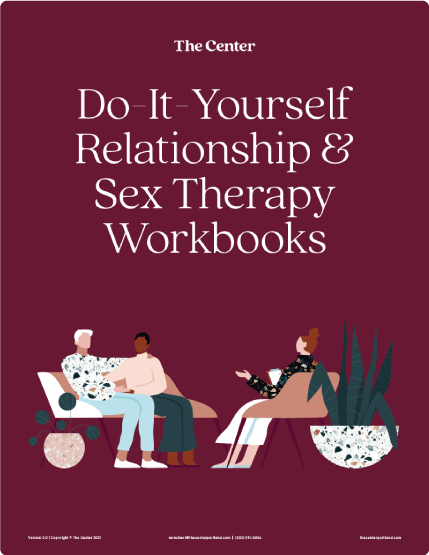Your partner used to initiate every time, but now you feel like you’re the one putting in all the effort. And the sex has come to a grinding halt.
“Why is my partner not interested in me sexually anymore?”
If your partner doesn’t want to have sex with you, it’s easy to feel down on yourself—but the truth is, there could be any number of reasons why your partner has stopped having sex.
Here are some of the biggest reasons why your partner may not be interested in sex. Plus what you can do about it.
Life Distractions
Over time, life priorities can shift. Hectic work schedules, caring for family members, and managing a household can leave little room for couple-time. Add children to the mix, and it’s easy to see how sex may not be the first thing on their mind.
How to Combat Distractions and Re-Prioritize Sex
Yes, the amount of sex you have will shift throughout your life. But don’t let distractions destroy your relationship.
It’s still important to prioritize sexual intimacy in your relationship. And assuming sex will always happen spontaneously is unrealistic. Plus, it puts too much pressure on you and your partner.
The solution? Scheduling sex. Carve out time for yourselves ahead of time, so you stay focused on your relationship needs.
Stress
Stress is the ultimate distraction. Stress not only detracts from your focus, but also causes you to dwell on negative thoughts and feel overwhelmed.
This can lead to withdrawal from friends, family, and activities once enjoyed.
What to Do When Your Partner Doesn’t Want to Have Sex Due to Stress
In many cases, your partner may be dealing with their own stressors that have nothing to do with you or the relationship.
If you’ve noticed your partner seems stressed, ask how you can help or support them. They may need some time to work through their stressors before they can feel like their best sexual self again.
Emotional Tension Within the Relationship
If there’s tension in the relationship, it can be hard to want to spend time with your partner. If you’re constantly arguing and feeling like you’re not being heard, resentment can build up.
And it’s hard to have good sex when we’re irritated with our partners.
What to Do When Emotional Tension Gets in the Way
If this sounds like your relationship, it’s first important to close the rifts and restore the connection and care that you once had. Without reestablishing that emotional connection, it’s going to be an uphill battle to regain the sexual connection.
If you can’t do this on your own, you’ll probably want to consider couples therapy.
Things Have Become Too Routine
If you’ve been together for years—or even decades—it’s not uncommon for things to feel a bit… stale.
What was once exciting became comfortable, and now feels more like a chore. If the sex is boring, why bother? Your partner might be feeling this way.
What to Do When Sex Has Become Too Routine
This is something that can happen in long-term relationships—but it doesn’t have to!
Reignite some of that new relationship passion by doing things that are out of the ordinary. Try a new activity. Expand your sexual experiences together.
Breaking out of your comfort zone can open the door to new and exciting experiences and help rekindle desires.
Your Partner Has Low Sexual Desire
Sexual desire discrepancies are some of the most common reasons couples come into couples therapy. If you want sex more often than your partner, it can feel like a real blow to your self-esteem if they’re not interested.
But it’s not your fault. The simple truth is, everyone has different levels of sexual desire.
What to Do When Your Partner Has Lower Sexual Desire
Communication around needs is essential here. Each partner needs to feel like they’re being heard.
And if your desires are mismatched, you and your partner need to learn to navigate how to meet each other’s sexual, emotional, and romantic needs.
Resolving mismatched desires can be challenging, but couples don’t need to do it alone. Sex therapists have the skill and expertise to help you handle these conversations in a productive and supportive way.
Physical & Mental Health Issues
Chronic health conditions can be a major contributor to low sexual desire. From the physical symptoms to the emotional toll, it can be hard to want to engage in any type of activity—let alone sex.
Some common issues that can lead to low desire:
- Anxiety
- Arthritis
- Depression
- Diabetes
- Heart disease
- Sexual pain conditions
What to Do When Your Partner Has a Chronic Condition
Both mental illness and chronic physical conditions can impact sexual desire and functioning. If this is the case for your partner, it’s important to be understanding and supportive.
Supporting a partner experiencing mental health concerns or chronic illness is not easy, but your relationship can survive. You might find that a sex therapist can help you both find new ways to engage physically.
Medication
It’s not just the health conditions, but the medications used to treat many conditions can also lead to low desire. Some common culprits include:
- Antidepressants
- Antiepileptics
- Antihistamines
- Birth control pills
- Cancer treatment
- Heart and blood pressure medications
- Opioids
What to Do When Medication Zaps Sexual Desire
Your partner can talk to their doctor and see if any other options might be a better fit. If not, it’s important to have an open and honest conversation about how the medication is impacting your relationship, and what you can do to work around it.
Sexual Pain
Sex can look different for different couples—but it should always feel good. And sometimes our bodies and brains get in the way of accessing the pleasure we crave.
Many people—including many medical professionals—are not aware of the sexual pain conditions that can make sex difficult, or even impossible. These conditions can include dyspareunia, pelvic floor tightness, and vaginismus, among others. Painful sexual experiences can lead to issues with self-confidence, feeling anxiety around sex, and avoiding all sexual activity.
What To Do When Your Partner Experiences Sexual Pain
Sexual pain conditions often require coordination of medical support and therapy. You can support your partner by learning about their condition and advocating for their needs. You and your partner may also need to learn new ways to experience intimacy and sexual pleasure.
Erectile Dysfunction
Erectile dysfunction is more common than you think, affecting about 30 million men in the United States. But it can be incredibly frustrating and embarrassing—leading your partner to want to avoid sex altogether.
Certain factors can lead to erectile dysfunction (ED), including:
- Age
- Chronic health issues
- Medications
- Mental health struggles
- Performance Anxiety
What To Do When Your Partner Is Struggling With ED
Erectile dysfunction is likely a great source of stress and embarrassment for your partner. It’s important to approach your partner with empathy and understanding. If they’re open to it, you can offer to help them find resources or treatment options.
How We Help Couples With Low Sexual Desire
Quite a few reasons can lead one partner to lose interest in sex. And it’s normal for sexual desire to fluctuate throughout our lives.
But if you and your partner are struggling to maintain a satisfying sexual relationship, it can put a strain on your whole relationship.
At The Center for Couples & Sex Therapy, we understand the elements that lead to happier, more fulfilling relationships. And we understand the obstacles that can get in the way.
We know what’s possible for your relationship, because we’ve seen it happen time and time again. With a little help, you can get there too. Ready to see for yourself?







